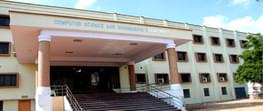Dr. K. Prasanna Kumar is an Associate Professor and the Head of the Department of Electronics and Communications Engineering at St. Peter’s Engineering College. He holds a PhD degree from K L Deemed to be University, an M.Tech. in VLSISD from Pydah College of Engineering and Technology, and a B.Tech. in ECE from MVGR College of Engineering. Dr. Kumar has 15 years of experience in his field, where he has worked in multiple roles and published research papers in various international and national journals.

What is the latest program that you are offering in your institute/dept. which will help students outperform and stand apart from the crowd?
The ECE students are provided with industrial training, which is the latest programme offered by our department. The outcome of the course is a mini project that is carried out in our confined core area. Students get to learn the latest technologies in the field, and it teaches all the necessary skills that the industry is actually looking for.
What are the factors that make this program the best for the students to opt?
Students who opt for the ECE programme will have a chance to settle in diversified fields. They have the option to enter the IT field on par with CSE-related branches. They are also eligible for jobs in the core areas of electronics and communications.
What will you say the “best practices” in the course you’re offering?
The department of ECE follows various teaching learning practices. We adopt practices like peer learning, extra certification courses, and regular guest lectures from various industry and academic experts. All of these are meant to supplement the regular curriculum material and to learn extra skills.
What are some valuable insights of the program that you are offering at your institute/dept.?
Our college regularly holds workshops and training programmes for the students. These are perfect for students to gain hands-on practical experience in the field. We also hold boot camps for the students, along with competitions for them to practice their learned skills and knowledge.
How does the program ensure that students are being prepared for the future?
The programme structure, or curriculum, is well organized by academicians and industry experts such that it includes all the latest trends and topics so that the students, by the end of the course, will be able to learn basic concepts as well as the needs of the industry.
Check St.Peter’s Engineering College Courses & Fees
How did you train yourself/faculty to deliver this program to the students?
Faculty are made to attend various faculty development programmes and workshops by the college. These are perfect for getting accustomed to and updating themselves on their subject. They also learn new teaching methodologies that they can employ with the students before the start of the semester.
How do you tend to build an industry connect with this program?
Since our college is an autonomous institute, when framing the curriculum, we have an industry expert as a member of the Board of Studies. Along with input from academicians, we also take feedback from industry experts to help us frame the syllabus. Additionally, we do conduct various guest lectures and workshops from the industry to have continuous connectivity with the industry.
What were the challenges that you faced while inculcating this program in your curriculum?
We faced challenges in the IT domain. We have issues upgrading to the technology that is used in the classrooms and laboratories. However, we are working towards and getting accustomed to the IT sector to turn these challenges into opportunities.
What are the types of projects that the students are working on through this program?
Our students get to choose their own projects based on their choice and interest. Some of our past students has worked on projects related to various domains such as IoT, Aurduino, Raspberry Pi, Antennas, VLSI, Embedded systems, and artificial intelligence and machine learning.
What are the benefits and career options after pursuing this course?
After completion of this course, students have the option to enter the IT field on par with CSE-related branches. They can also enter jobs in the core areas of electronics and communications. Students can also continue learning and carrying out their research by pursuing post-graduation and doctoral degrees after this course.

![St Peter's Engineering College - [SPEC]](https://image-static.collegedunia.com/public/college_data/images/logos/1628692037stpetershydnewlogo.jpg?h=71.7&w=71.7&mode=stretch)


.jpeg?h=132&w=263&mode=stretch)

.png?h=132&w=263&mode=stretch)


.jpeg?h=78&w=78&mode=stretch)











.png?h=42.55&w=42.98&mode=stretch)














.jpeg?h=72&w=72&mode=stretch)
.jpeg?h=72&w=72&mode=stretch)

.png?h=72&w=72&mode=stretch)
.png?h=72&w=72&mode=stretch)
.jpeg?h=72&w=72&mode=stretch)
 (1).png?h=72&w=72&mode=stretch)
.jpeg?h=72&w=72&mode=stretch)
.png?h=72&w=72&mode=stretch)
.png?h=72&w=72&mode=stretch)

















Comments